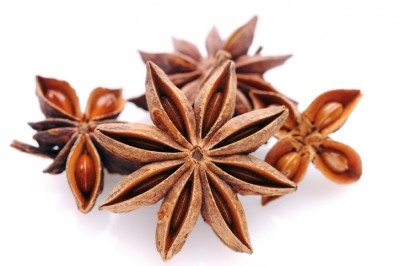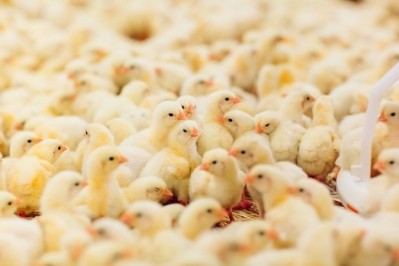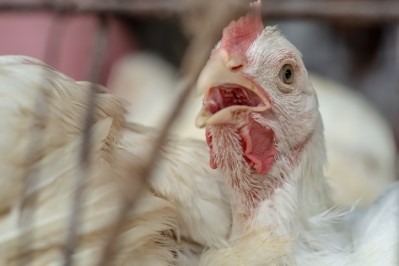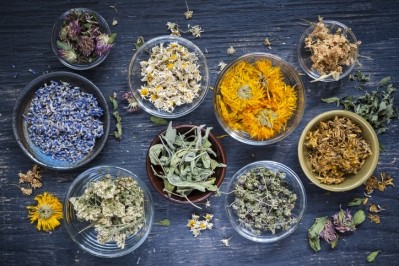Adding curcumin to quail diets may boost production, cold stress response
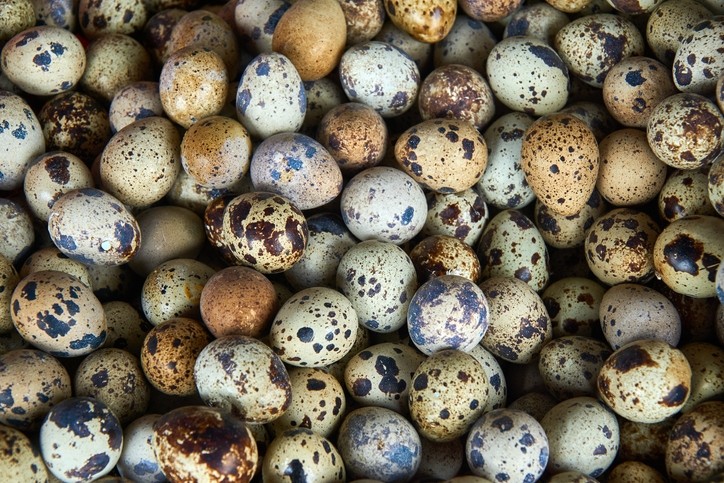
A team of researchers from Brazil explored the use of free and nano-encapsulated curcumin as a feed additive in the diets of farm-raised quail facing a cold stress challenge.
The group published its work in the journal, Animal Feed Science and Technology.
“Thus, the aim of this study was to evaluate whether the addition of nano-capsules containing curcumin in the diet of Japanese quails could enhance the antioxidant effect of egg yolk and improve their quality indices during thermal stress,” the researchers said.
The researchers found that adding higher levels of either free or nano-encapsulated curcumin – diets with 30mg free curcumin (T30) or 10mg encapsulated curcumin (T10) – boosted egg production, improved feed conversion and increased levels of monosaturated fatty acids.
Egg brightness and yellowness were higher in eggs from birds receiving dietary curcumin and the amounts of substances reactive to thiobarbituric acid (TBARS) were lower, they said.
Eggs from birds on supplemented diets were higher in antioxidants, and eggs from birds on the T10 diet had lower levels of saturated fatty acids and polyunsaturated fatty acids.
“The use of curcumin in the diet of quails exposed to thermal stress improved egg quality,” the researchers said. “The nanotechnology was able to potentiate the antioxidant effect of curcumin since doses three times lower where used compared to free curcumin, as well as increased the unsaturated fatty acids levels, which can be beneficial to consumer´s health.”
Quail production considerations
Eggs have become a recognized protein source for human consumption, based, in part on the low fat content and ease of preparation, the researchers said.
Quail production is also straightforward with low investment requirements and the ability to provide salable eggs for the consumer market.
“Thus, quail production is one of the most profitable activity of the market, especially in developing countries,” they said.
However, there are some challenges linked to the rapidity of production and reproduction, they said. And, birds can be sensitive to disease and thermal stress.
“The main form to minimize or avoid these problems is linked to suitable nutrition, with emphases in the supplementation with minerals, vitamins and natural products, as phytogenic, extracts, oils and essential oils,” the researchers said.
Why nano-encapsulated curcumin in quail feed?
Of the natural compounds or additives curcumin is of interest as it is considered a functional molecule that can be used as a feed additive, the researchers said.
“Curcumin is extracted from a plant Curcuma longa and it is a phytotherapic candidate due to its potent antimicrobial, anticoccidian, antioxidant, anti-inflammatory and immunostimulant properties as well as due to its thermal stability,” they added.
When added to dairy sheep diets, the additive was found to increase the level of unsaturated fatty acids and antioxidant capacity in milk while lowering the levels of saturated fatty acids, they said.
Another sheep study found that using nano-capsules of curcumin may boost results with a lower amount of the additive.
“The nanotechnology is an emergent technology that can be used in a wide range of research areas, especially when the nanoparticles are used to deliver bioactive compounds to their target at the appropriate time and dosage,” the researchers said.
However, no work has been done exploring the use of nano-encapsulated curcumin with quail, they added.
In poultry production, cold temperatures are a concern as they can negatively influence health, survival, product quality and bird growth, they said.
Oxidative stress, the imbalance between oxidants and antioxidants, however, is thought to be reversible.
Previous studies suggest that curcumin could ease oxidative stress damage in heat-stressed quail by “modulating the hepatic nuclear transcription factors and heat shock proteins,” they said. But, cold stress may be a larger challenge and has been liked to poor production and reduced feed intake, they added.
That loss of production is an impetus to find an alternative way to reduce the problems generated by low temperatures, they said.
Feeding trial details
In the feeding trial, 60, 30-day-old birds received one of four corn- and soybean meal-based diets for 21 days during a period of thermal stress, the researchers said.
Curcumin used in the diets was commercially available.
The diets included varying levels of curcumin at 0 (control) 30mg free curcumin/kg of feed (T30), 3mg of nano-encapsulated curcumin/kg of feed (T3), or 10mg nano-encapsulated curcumin/kg of feed (T10), they said.
Birds were raised in 1 to 17 degree C (33.8-62.6 F) weather.
Eggs laid during the cycle were collected and evaluated, and bird feed consumption was measured, they said.
Feed conversion per egg was calculated and a selection of eggs from each bird were analyzed for specific gravity, yolk index, yolk and albumen pH, Haugh unit, color and fatty acid profile along with the percentage of bark, albumen and yolk.
A selection of eggs was also checked for oxidant and antioxidant status in the yolk, thiobarbituric acid reactive substances (TBARS) and antioxidant capacity against peroxyl radicals (ACAP), the researchers said.
Results
Birds on the diets with higher levels of both free and encapsulated curcumin – diets T30 and T10 – had increased egg production and improved feed conversion compared to birds on the control diet, the researchers said.
Birds on the T30 diet had eggs with higher masses and heavier weights, but feed intake did not vary by diet.
“It is possible to conclude that curcumin used to feed quails: 1) has beneficial effects on egg quality under thermal stress; 2) improves productive; 3) enhances egg yolk color which is a positive characteristic for consumers; 4) increases the antioxidant effect and reduces lipid peroxidation; 5) alters the fatty acid profile, i.e., reduces saturated fatty acids and increases unsaturated fatty acids; 6) can be used with nanotechnology which potentiates its antioxidant effect, allowing the use of doses three time lower when nano-encapsulated,” they said.
“Finally, we also conclude that the addition of curcumin in the diet of quails has beneficial effects on egg quality under thermal stress,” they added.
Eggs tended to have similar specific gravity, Haugh unit, yolk index, yolk pH, albumen pH, yolk percentage, eggshell percentage and albumen percentage, the researchers said.
However, eggs from birds on supplemented diets had improved luminosity and yellow intensity, while eggs from birds on the T30 diet had reduced red intensity, compared to control.
TBARS levels were reduced in eggs from quail on the supplemented diets, and ACAP levels were higher – with T10 eggs showing the highest total antioxidant capacity, they said.
The sum of all saturated fatty acids was lower, and the sum of monounsaturated fatty acids was increased in eggs from birds on the T10 diet.
Fat level in the egg yolks was higher in eggs from birds on the T3 diet than on the T10 diet, they said.
Source: Animal Feed Science and Technology
Title: Curcumin in the diet of quail in cold stress improves performance and egg quality
Authors: M. Marchiori, R. Oliveira, C. Souza, M. Baldissera, Q. Ribeiro, R. Wagner, S. Gündel, A. Ourique, J. Kirinus, L. Stefani, M. Boiago, A. da Silva
